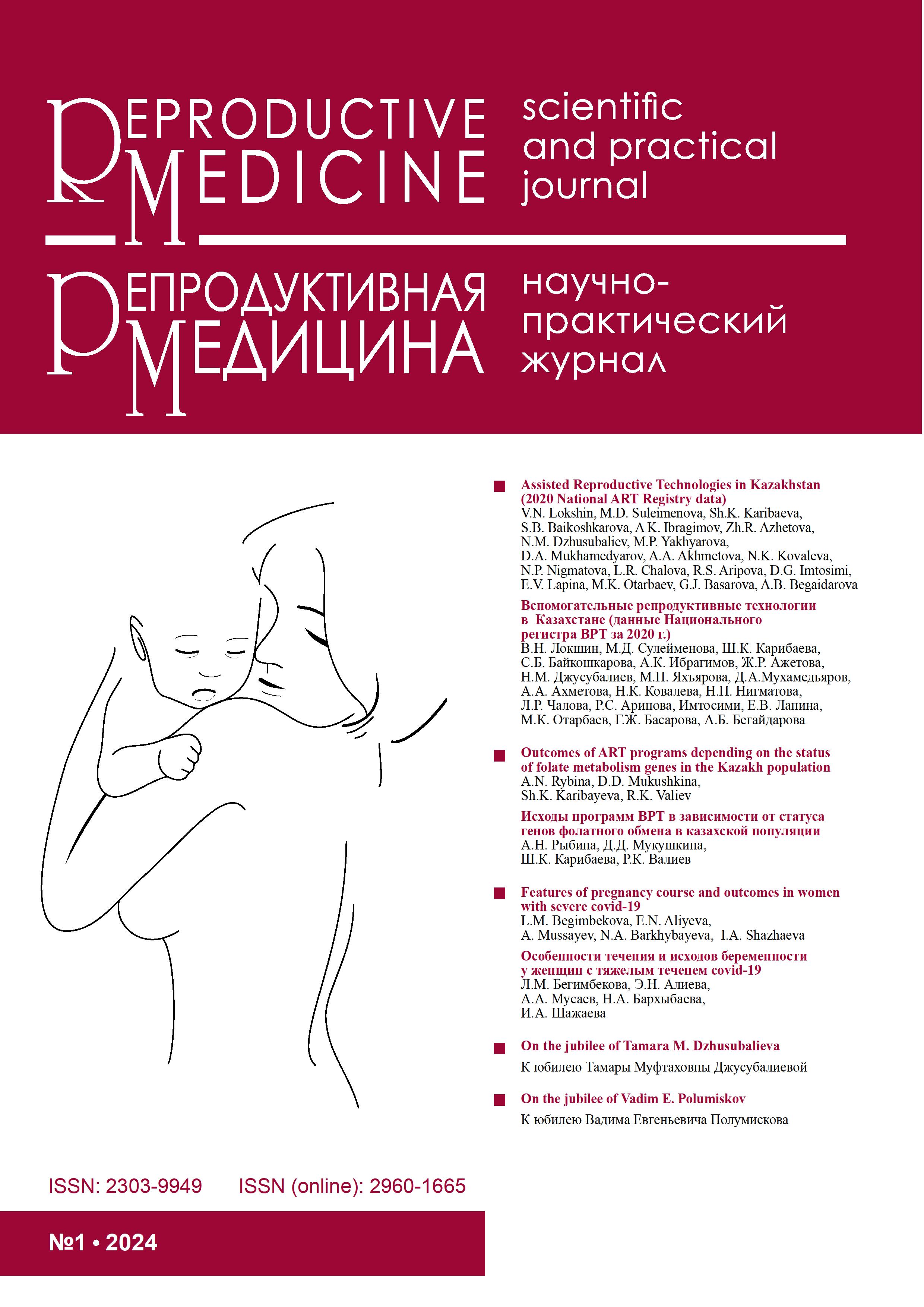Clinical-morphological criteria for HRAS oncoprotein-related breast cancer
DOI:
https://doi.org/10.37800/RM.1.2024.74-80Keywords:
breast cancer, HRAS, immunohistochemistry, RECIST, progression-free survivalAbstract
Relevance: Researchers' interest in the HRAS gene has grown due to the discovery of this gene's increased expression in breast cancer.
Activated forms of Ras increase in breast cancer cell lines and EGFR or HER2 expression. Consequently, Ras can be activated in breast tumors in the absence of direct mutational activity and reach 20-50% of cases. Inhibiting expression by interrupting signaling pathways from H-Ras to the nucleus may be a promising therapeutic approach.
The study aimed to study the clinical and morphological criteria of locally progressive breast cancer and the expression of the HRAS cancer protein in patients receiving various treatment regimens with a farnesyltransferase inhibitor to improve early diagnosis.
Materials and Methods: We were adopted between January 2016 and February 2019 by a group of 100 patients diagnosed with local breast cancer. Their age ranged from 29 to 78 years old, and the average age was 59±—determination of immunohistochemical expression of oncohistochemical preparations of HRAS.
Results: In breast cancer patients, there was an association between HRAS expression and Her2/neu expression (P=0.001) and the ki-67 tumor proliferation index (P=0.001). Analysis of the relationship between H-Ras expression showed a relatively strong association with progression-free survival before treatment (V=0.47; p=0.001) and after treatment (V=0.45; p=0.001).
Conclusion: These results may indicate the clinical use of HRAS as a prognostic factor or therapeutic target for breast cancer.
References
Petrelli F, Coinu A, Lonati V, Cabiddu M, Ghilardi M, Borgonovo K, Barni S. Neoadjuvant dose-dense chemotherapy for locally advanced breast cancer: a meta-analysis of published studies. Anticancer Drugs. 2016;27(7):702-708. https://doi.org/10.1097/CAD.0000000000000369
Zhumakayeva AM, Sirota VB, Rakhimov KD, Arystan L, Madiyarov A, Adekenov S. Long-term results of combination therapy for locally advanced breast cancer. Georgian Medical News. 2018;282:30-35.
https://pubmed.ncbi.nlm.nih.gov/30358536/
Li FY, Wu SG, Zhou J, Sun JY, Lin Q, Lin HX, Guan XX, He ZY. Prognostic value of Ki-67 in breast cancer patients with positive axillary lymph nodes: a retrospective cohort study. PLos One. 2014;9:87264.
https://doi.org/10.1371/journal.pone.0087264
Park YH, Jung HH, Do IG, Cho EY. A seven-gene signature can predict distant recurrence in patients with triple-negative breast cancers who receive adjuvant chemotherapy following surgery. Int J Cancer. 2015;136:1976-1984.
https://doi.org/10.1002/ijc.29233
Kazi A, Xiang S, Yang H, Kennedy P, Ayaz M, Fletcher S, Cummings C, Lawrence HR, Beato F, Kang Y, Kim MP, Delitto A, Underwood PW, Fleming JB, Trevino JG, Hamilton AD, Sebti SM. Dual Farnesyl and Geranylgeranyl Transferase Inhibitor Thwarts Mutant KRAS-Driven Patient-Derived Pancreatic Tumors. Clin Cancer Res. 2019;25:5984-5996.
https://doi.org/10.1158/1078-0432.CCR-18-3399
Horn D, Hess J, Freier K, Hoffmann J, Freudlsperger C. Targeting EGFR-PI3K-AKT-mTOR signaling enhances radiosensitivity in head and neck squamous cell carcinoma. Expert Opin. Ther Targets. 2015;6(19):795-805.
https://doi.org/10.1517/14728222.2015.1012157
Murugan AK, Grieco M, Tsuchida N. RAS mutations in human cancers: Roles in precision medicine. Seminars Cancer Biol. 2019;23:1044.
https://doi.org/10.1016/j.semcancer.2019.06.007
Untch M, Jackisch C, Schneeweiss A, Schmatloch S, Aktas B, Denkert C, Schem C, Wiebringhaus H, Kümmel S, Warm M, Fasching PA, Just M, Hanusch C, Hackmann J, Blohmer JU, Rhiem K, Schmitt WD, Furlanetto J, Gerber B, Huober J, Nekljudova V, Von Minckwitz G, Loibl S. NAB-Paclitaxel Improves Disease-Free Survival in Early Breast Cancer: GBG 69-GeparSepto. J Clin Oncol. 2019;37:2226-2234.
https://doi.org/10.1200/JCO.18.01842
Mateus de Oliveira Taveira M, Nabavi S, Wang Y. Genomic characteristics of trastuzumab-resistant Her2-positive metastatic breast cancer. J Cancer Res Clin Oncol. 2017;143:1255-1262.
https://doi.org/10.1007/s00432-017-2358-x
Garg M, Prabhakar N, Singla V, Singh T, Singh G, Bal A, Khandelwal N. Breast cancer in a patient with neurofibromatosis type 1.
Breast J. 2018;24:666-668.
https://doi.org/10.1111/tbj.12987
Barklis E, Stephen AG, Staubus AO, Barklis RL, Alfadhli A. Organization of Farnesylated, Carboxymethylated KRAS4B on Membranes. J Mol Biol. 2019;431:3706-3717.
https://doi.org/10.1016/j.jmb.2019.07.025
Baum JE, Sung KJ, Tran H, Song W, Ginter PS. Mammary Epithelial-Myoepithelial Carcinoma: Report of a case with HRAS and PIK3CA Mutations by Next-Generation Sequencin. Int J Surg Pathol. 2019;27:441-445.
https://doi.org/10.1177/1066896918821182
Bonnot PE, Passot G. RAS mutation: site of disease and recurrence pattern in colorectal cancer. Chin Clin Oncol. 2019;8:55. https://doi.org/10.21037/cco.2019.08.11
Ruicci KM, Pinto N, Khan MI, Yoo J, Fung K, MacNeil D, Mymryk JS, Barrett JW, Nichols AC. ERK-TSC2 signaling in constitutively- active HRAS mutant HNSCC cells promotes resistance to PI3K inhibition. Oral Oncol. 2018;84:95-103.
https://doi.org/10.1016/j.oraloncology.2018.07.010
Singh D, Attri BK, Gill RK, Bariwal J. Review on EGFR Inhibitors: Critical Updates. Mini Rev Med Chem. 2016;16(14):1134-1166. https://doi.org/10.2174/1389557516666160321114917
Talukdar S, Emdad L, Das SK, Fisher PB. EGFR: An essential receptor tyrosine kinase-regulator of cancer stem cells. Adv Cancer Res. 2020;147:161-188.
https://doi.org/10.1016/bs.acr.2020.04.003
Zhang X, Xu F, Tong L, Zhang T, Xie H, Lu X, Ren X, Ding K. Design and synthesis of selective degraders of EGFRL858R/T790M mutant. Eur J Med Chem. 2020;192:112-199.
https://doi.org/10.1016/j.ejmech.2020.112199
Rajaram P, Chandra P, Ticku S, Pallavi BK, Rudresh KB, Mansabdar P. Epidermal growth factor receptor: Role in human cancer. Indian J Dent Res. 2017;28(6):687-694.
Downloads
Published
How to Cite
Issue
Section
License
Copyright (c) 2024 The rights to a manuscript accepted for publication are transferred to the Journal Publisher. When reprinting all or part of the material, the author must refer to the primary publication in this journal.

This work is licensed under a Creative Commons Attribution-NonCommercial-NoDerivatives 4.0 International License.
The articles published in this Journal are licensed under the CC BY-NC-ND 4.0 (Creative Commons Attribution – Non-Commercial – No Derivatives 4.0 International) license, which provides for their non-commercial use only. Under this license, users have the right to copy and distribute the material in copyright but are not permitted to modify or use it for commercial purposes. Full details on the licensing are available at https://creativecommons.org/licenses/by-nc-nd/4.0/.





